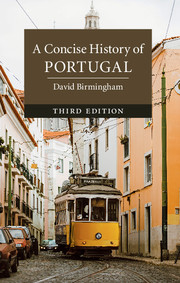Book contents
- Frontmatter
- Dedication
- Contents
- List of illustrations
- Preface to the third edition
- Map1
- Introduction
- Map2
- 1 Peoples, cultures and colonies
- 2 Rebellion and independence in the seventeenth century
- 3 The golden age and the earthquake in the eighteenth century
- 4 Brazilian independence and the Portuguese Revolution
- 5 The bourgeois monarchy and the republicans
- 6 The dictatorship and the African empire
- 7 Democracy and the European Community
- Afterword: entering the twenty-first century
- The houses of Avis, Beja and Habsburg
- The houses of Braganza and Braganza-Saxe-Coburg
- Republican presidents
- Select source materials
- Selected works published since 1990
- Further reading in English
- Index
1 - Peoples, cultures and colonies
Published online by Cambridge University Press: 28 March 2018
- Frontmatter
- Dedication
- Contents
- List of illustrations
- Preface to the third edition
- Map1
- Introduction
- Map2
- 1 Peoples, cultures and colonies
- 2 Rebellion and independence in the seventeenth century
- 3 The golden age and the earthquake in the eighteenth century
- 4 Brazilian independence and the Portuguese Revolution
- 5 The bourgeois monarchy and the republicans
- 6 The dictatorship and the African empire
- 7 Democracy and the European Community
- Afterword: entering the twenty-first century
- The houses of Avis, Beja and Habsburg
- The houses of Braganza and Braganza-Saxe-Coburg
- Republican presidents
- Select source materials
- Selected works published since 1990
- Further reading in English
- Index
Summary
The making of modern Portugal began with the revolution of 1640 and a twenty-eight-year war with Spain. The people of Portugal are of course very much older than the modern state and their history is long and rich. Indeed the medieval kingdom of Portugal is sometimes described as Europe's earliest surviving polity. The cultural roots of Portuguese society go back yet further. Stone Age men and women roamed over western Iberia and even if they did not prosper at least they gave their deceased leaders proper megalithic burials. Neolithic Portugal experimented with the rearing of domestic, or semi-domestic, animals and with the taming of cereal plants; it also developed the marine harvesting of fish which was to become a permanent source of nutrition and economic well-being over the centuries. Portuguese art evolved from stone beads and bone carvings to the ornamentation of early crockery, a craft which has been carried forward to present times. The relatively open frontier on the north and east allowed migrants to come and go bringing each new facet of human technology including copper working, bronze casting and ultimately the making of iron tools. The age of metals also introduced the fashioning of costly jewellery, and the search for gold, both at home and abroad, ran like a fine thread through the subsequent history of Portugal.
During the Iron Age Portuguese culture was regularly enriched by new peoples and ideas from the outer world of Europe, the Mediterranean and Africa. The old Celts, linguistically related to the Bretons and the Welsh, came overland seeking opportunities to farm and settle. Family structure in northern Portugal, and the organisation of villages, derived from Celtic experience. The Celts were also an important source of artistic influence and their musical traditions based on the bagpipes were carried down the ages. In coastal areas colonising influences were brought by sea traders from the Phoenician cities of the Levant. The mines of Portugal, like those of Cornwall, enriched the ‘civilisations’ of the Mediterranean. Phoenician mariners were succeeded by Greeks and Carthaginians who also left their stamp on the harbours and beaches of the Atlantic shore. Long-distance merchants introduced a shipbuilding technology and a taste for imported wines in jars to supplement the local beers. The greatest colonisers of Portuguese antiquity, however, were the Romans. They colonised both the interior and the seashore.
- Type
- Chapter
- Information
- A Concise History of Portugal , pp. 11 - 34Publisher: Cambridge University PressPrint publication year: 2018



